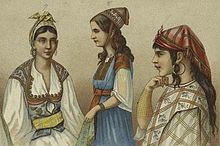
Back تركمان الجزائر Arabic الجزایر تورکلری AZB تورک لە جەزائیر CKB ترکهای الجزایر Persian Turcs en Algérie French Cezayir Türkleri Turkish 阿爾及利亞的土耳其人 Chinese

The Turks in Algeria, also commonly referred to as Algerian Turks,[1][2][3][4][5] Algerian-Turkish[6][7] Algero-Turkish[8] and Turkish-Algerians[9] were the ethnic Turkish and renegades who emigrated to Algeria during the Ottoman period. A significant number of Turks intermarried with the native population, and the male offspring of these marriages were referred to as Kouloughlis (Turkish: kuloğlu) due to their mixed Turkish and central Maghrebi heritage.[10][11] However, in general, intermarriage was discouraged, in order to preserve the "Turkishness" of the community.[12] Consequently, the terms "Turks" and "Kouloughlis" have traditionally been used to distinguish between those of full and partial Turkish ancestry.[13]
- ^ de Tocqueville, Alexis (2001), "Second Letter on Algeria", Writings on Empire and Slavery, Johns Hopkins University Press, p. 15, ISBN 0801865093
- ^ Garcés, María Antonia (2005), Cervantes in Algiers: A Captive's Tale, Vanderbilt University Press, p. 122, ISBN 0826514707
- ^ Jaques, Tony (2007), Dictionary of Battles and Sieges: A-E, Greenwood Publishing Group, p. 32, ISBN 978-0313335372
- ^ Fumerton, Patricia (2006), Unsettled: The Culture of Mobility and the Working Poor in Early Modern England, University of Chicago Press, p. 85, ISBN 0226269558
- ^ Today's Zaman. "Turks in northern Africa yearn for Ottoman ancestors". Archived from the original on 2011-03-13. Retrieved 2012-03-18.
- ^ Knauss, Peter R. (1987), The Persistence of Patriarchy: Class, Gender, and Ideology in Twentieth Century Algeria, Greenwood Publishing Group, p. 19, ISBN 0275926923
- ^ Killian, Caitlin (2006), North African Women in France: Gender, Culture, and Identity, Stanford University Press, p. 145, ISBN 0804754209
- ^ Murray, Roger; Wengraf, Tom (1963), "The Algerian Revolution (Part 1)", New Left Review, 1 (22): 41
- ^ McMurray, David Andrew (1992), "The Contemporary Culture of Nador, Morocco, and the Impact of International Labor Migration", University of Texas: 390
- ^ Stone, Martin (1997), The Agony of Algeria, C. Hurst & Co. Publishers, p. 29, ISBN 1-85065-177-9.
- ^ Milli Gazete. "Levanten Türkler". Archived from the original on 2010-02-23. Retrieved 2012-03-19.
- ^ Cite error: The named reference
Shuval 2000 loc=330was invoked but never defined (see the help page). - ^ Miltoun, Francis (1985), The spell of Algeria and Tunisia, Darf Publishers, p. 129, ISBN 1850770603,
Throughout North Africa, from Oran to Tunis, one encounters everywhere, in the town as in the country, the distinct traits which mark the seven races which make up the native population: the Moors, the Berbers, the Arabs, the Negreos, the Jews, the Turks and the Kouloughlis… descendants of Turks and Arab women.